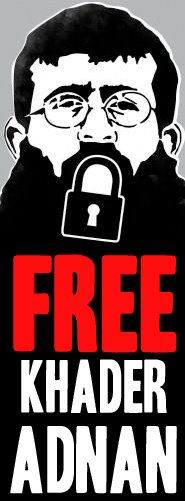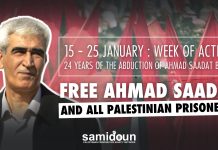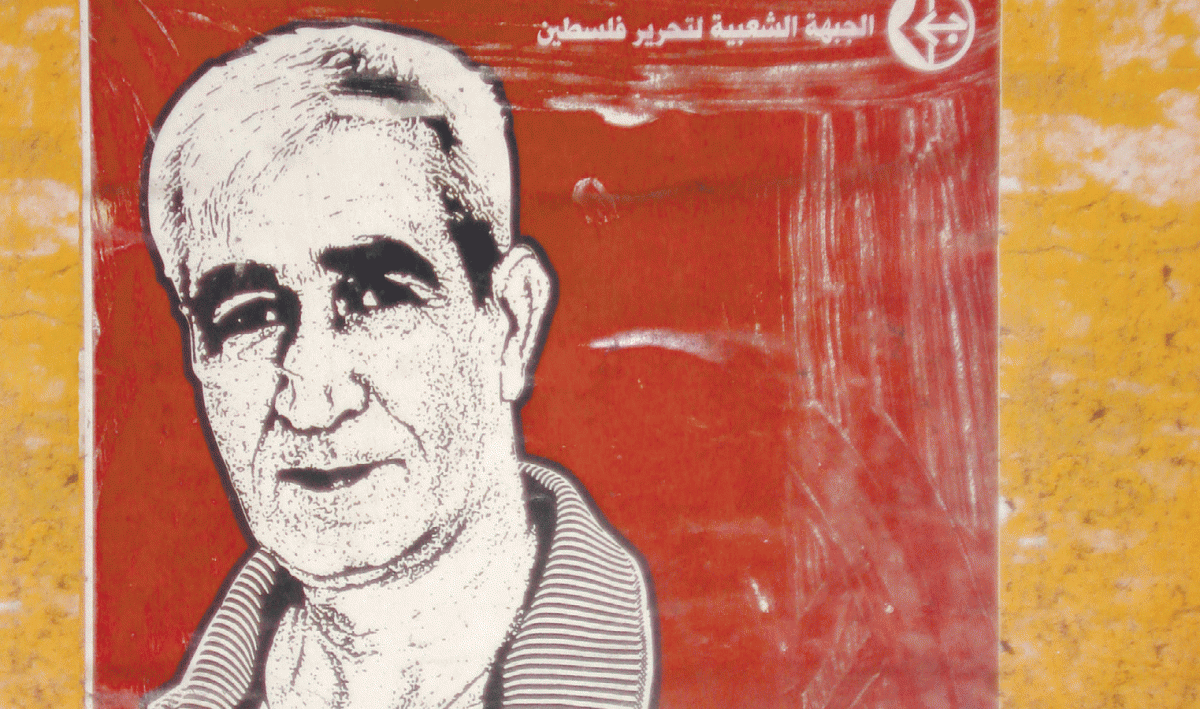
The situation of Khader Adnan, imprisoned Palestinian activist held without charge or trial under administrative detention, is urgent. Khader Adnan has been on an ongoing hunger strike since December 17, 2011, protesting abuse of his family, torture and inhumane treatment, and the use of administrative detention to imprison Palestinian activists without charge or trial.
Khader Adnan has completed 53 days of hunger strike and is now in a severe medical condition. Bobby Sands, the martyr of the Irish republican prisoners’ movement, died after 66 days of hunger strike, demanding justice and human rights from his own colonial captors, much as Khader Adnan did today.
Ahmad Sa’adat, imprisoned Palestinian national leader, joined with Marwan Barghouti from his isolation cell today to urge the immediate release of Khader Adnan. The Campaign to Free Ahmad Sa’adat echoes this call and urges activists around the world to raise the call to free Khader Adnan, a symbol of the resistance, resilience, steadfastness and courage of Palestinian prisoners and the Palestinian people, who has put his body and his life on the line inside the occupation’s jails, to claim his dignity, his rights, and the rights of his people.
TAKE ACTION: Please see the action items below, or write a letter and sign a petition at this widely circulated call: http://samidoun.ca/2012/02/take-action-for-hunger-striking-palestinian-prisoner-khader-adnan/
Picket, protest or call the Israeli embassy or consulate in your location and demand the immediate freedom of Khader Adnan, Ahmad Sa’adat and all Palestinian political prisoners. Make it clear that you are watching the situation of Khader Adnan and that Israel is responsible for his health and life, and demand an end to the use of isolation, solitary confinement, and administrative detention. Send us reports of your protests at Israeli embassies and consulates atcampaign@freeahmadsaadat.org.
Write to the International Committee of the Red Cross and other human rights organizations to exercise their responsibilities and act swiftly to demand that the prisoners’ demands are implemented. Email the ICRC, whose humanitarian mission includes monitoring the conditions of prisoners, at JER_jerusalem@icrc.org, and inform them about the urgent situation of Khader Adnan. Make it clear that arbitrary detention without charge or trial is unacceptable, and that the ICRC must act to protect Palestinian prisoners from cruel and inhumane treatment.
Addameer details the experience of Khader Adnan with the Israeli occupation. He is currently held under administrative detention (arbitrary detention without charge or trial, based on secret evidence, and renewable indefinitely for repeated periods of up to six months.) Khader Adnan was issued a four-month administrative detention order on January 8, which was confirmed on February 6. This is the eighth time Adnan has been detained, and he has served a total of six years in Israeli prisons – mostly without charge or trial under the administrative detention scheme.
Addameer reports:
Khader was arrested on 17 December 2011, when Israeli Occupying Forces (IOF) raided his home outside Jenin at 3:30 am. Before entering his house, soldiers used the driver that takes Khader’s father to the vegetable market, Mohammad Mustafa, as a human shield by forcing him to knock on the door of the house and call out Khader’s name while blindfolded. A huge force of soldiers then entered the house shouting. Recognizing Khader immediately, they grabbed him violently in front of his two young daughters and ailing mother.
The soldiers blindfolded him and tied his hands behind his back using plastic shackles before leading him out of his house and taking him to a military jeep. Khader was then thrown on his back and the soldiers began slapping him in the face and kicking his legs. They kept him lying on his back until they reached Dutan settlement, beating him on the head throughout the 10-minute drive. When they reached the settlement, Khader was pushed aggressively out of the jeep. Because of the blindfold, Khader did not see the wall right in front of him and smashed into it, causing injuries to his face.
Following his arrest, he was taken to interrogation, refused medical care and treatment, subject to physical abuse and mistreatment including being tied to a chair in a stressful position, causing extreme back pain, and pulling on his beard so hard that his hair was ripped out. Khader was subjected to abusive language about his family, and refused to speak any further to interrogators, as well as refusing food. In retaliation, he was placed into isolation and solitary confinement, denied family visits, awakened in the middle of the night and strip-searched. He has refused to end his strike, protesting the illegitimacy of his arbitrary detention by an illegal occupation authority as well as cruel and inhumane treatment and abuse.
This is not his first hunger strike – in 2005 he protested his isolation in Kfar Yuna with a 12-day hunger strike. Addameer has emphasized that the Israeli occupation is responsible for his life.







